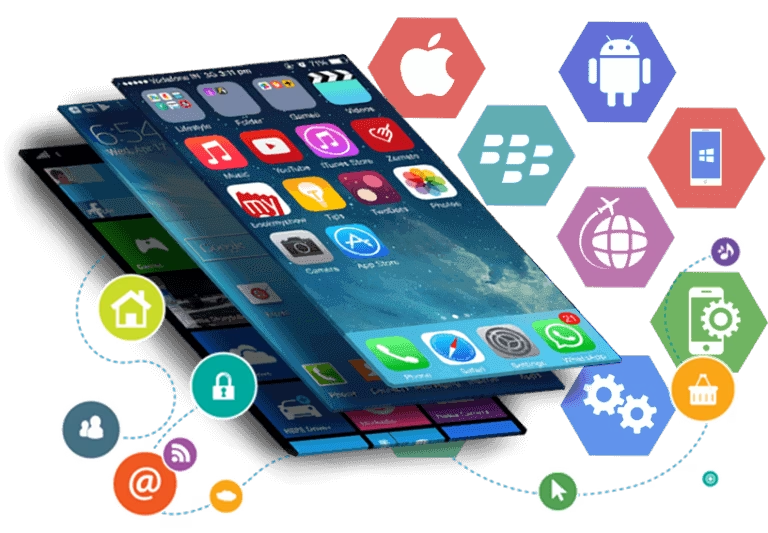Mobile apps have become central to business success in Nigeria. Customers now expect quick access, seamless transactions, and reliable service directly from their phones. Whether it is a fintech startup scaling payments, a retailer managing online orders, or a service provider improving client engagement, mobile solutions sit at the heart of growth.
For Nigerian CEOs, startup founders, and IT leaders, the question is no longer “Do we need an app?” but rather “How do we build the right one for our business?” The decision involves cost, security, compliance, platform strategy, and long-term maintenance. Each factor affects revenue, customer trust, and operational efficiency.
This guide addresses the most important mobile app FAQs business leaders raise. Each section provides clear, actionable answers drawn from years of hands-on experience by our development team at eBrand Promotion.
1. How Much Does It Cost to Build a Mobile App in Nigeria?
Cost depends on app type, feature depth, and platform choice. CEOs must plan for both development and ongoing maintenance.
| Type of App | Estimated Range (₦) | Notes |
|---|---|---|
| Basic business app (informational) | ₦3m – ₦5m | Simple UI, no complex integrations |
| E-commerce app | ₦5m – ₦12m | Includes payment gateway, inventory, push notifications |
| Fintech or enterprise app | ₦12m – ₦30m+ | Requires NDPR compliance, high-level security, multi-currency support |
Beyond these figures, businesses must budget for hosting, updates, and user support. Costs scale with complexity, which is why aligning budgets with strategy is critical.
2. How Long Does Development Take?
Project scope defines timelines.
-
Simple apps: 2–3 months
-
E-commerce or booking apps: 4–6 months
-
Fintech or enterprise-grade apps: 6–12 months
The main cause of delay is shifting requirements. CEOs should ensure stakeholders finalize features during planning to avoid unnecessary extensions.
3. Which Platforms Should Nigerian Businesses Target?
Platform strategy determines reach and efficiency.
-
Android first: Cost-effective, widest audience
-
iOS too: Strategic for premium markets like finance and real estate
-
Cross-platform: Frameworks such as Flutter or React Native allow one build for both systems
Choosing the right platform avoids waste and ensures businesses target their exact customer base.
Explore our mobile app development guide for platform selection strategies.
4. How Secure Are Mobile Apps in Nigeria?
Security remains a core business priority. With NDPR and CBN rules, compliance cannot be optional.
Key measures include:
-
End-to-end encryption
-
Regular security audits
-
NDPR-compliant data handling
-
Two-factor authentication
A breach damages brand reputation and invites regulatory penalties. CEOs must prioritize security from day one.
5. What Features Do Nigerian Customers Expect?
Customer adoption depends on functionality that solves real pain points. Critical features include:
-
Fast, mobile-first design
-
Local payment gateways (Paystack, Flutterwave, Interswitch)
-
Offline access for areas with weak connectivity
-
Push notifications for engagement
-
Loyalty and referral systems
User experience must remain the priority. Businesses that focus on seamless performance build stronger customer trust.
6. How Do Apps Integrate with Nigerian Payment Systems?
Payment gateway integration is at the heart of mobile app FAQs Nigeria. CEOs must select based on business model.
-
Paystack: Scales with SMEs
-
Flutterwave: Supports multi-currency payments
-
Interswitch: Works well for enterprise and government transactions
Choosing the right gateway ensures smoother customer transactions and better revenue tracking.
7. What Are the Maintenance and Upgrade Costs?
Every app requires continuous support. Annual costs range from 15–25% of the original build. These include:
-
Security patches
-
Feature enhancements
-
Operating system compatibility updates
-
Hosting and cloud fees
Smart leaders treat maintenance as a growth investment, not a burden.
8. Do Nigerian Businesses Really Need Custom Apps?
Off-the-shelf solutions rarely address Nigerian realities. Custom mobile app solutions offer better outcomes.
Advantages include:
-
FIRS and state tax compliance
-
NDPR-ready data management
-
Local logistics API integrations
-
Offline-first architecture
Custom builds give CEOs control over scalability, compliance, and long-term performance.
Learn why custom web development deliver stronger ROI.
9. What Challenges Should CEOs Expect?
Mobile development in Nigeria comes with unique barriers. Common challenges include:
-
Unstable power and internet access
-
Shortage of highly skilled developers
-
Shifting regulatory frameworks
Business leaders who anticipate these issues and choose the right partners reduce risk significantly.
10. How Do You Measure ROI for a Mobile App?
ROI varies by industry but always comes back to measurable gains.
-
E-commerce apps: More sales, fewer abandoned carts
-
Fintech apps: Higher sign-ups and faster transaction volumes
-
Enterprise apps: Lower operational costs and better efficiency
Decision-makers should track clear KPIs to confirm impact and refine strategy over time.
Conclusion: Partner with Experts Who Understand Nigeria
Mobile apps are no longer a luxury for Nigerian businesses. They are essential tools for growth, customer engagement, and operational efficiency. But success depends on working with partners who understand local realities — from NDPR compliance to offline-first design.
At eBrand Promotion, we specialize in building mobile apps tailored for Nigerian businesses. Whether you’re a CEO, startup founder, or IT lead, our team helps you move from idea to execution with clarity and confidence.
Ready to turn your mobile app idea into a revenue engine? Contact eBrand Promotion today for a consultation.


